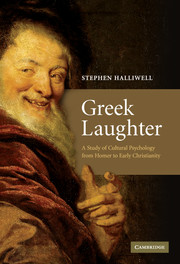Book contents
- Frontmatter
- Contents
- Preface
- Note to the reader
- Abbreviations
- 1 Introduction: Greek laughter in theory and practice
- 2 Inside and outside morality: the laughter of Homeric gods and men
- 3 Sympotic elation and resistance to death
- 4 Ritual laughter and the renewal of life
- 5 Aischrology, shame and Old Comedy
- 6 Greek philosophy and the ethics of ridicule
- 7 Greek laughter and the problem of the absurd
- 8 The intermittencies of laughter in Menander's social world
- 9 Lucian and the laughter of life and death
- 10 Laughter denied, laughter deferred: the antigelastic tendencies of early Christianity
- Appendix 1 The Greek (body) language of laughter and smiles
- Appendix 2 Gelastic faces in visual art
- Bibliography
- Index of selected authors and works
- Index of selected Greek terms
- General index
9 - Lucian and the laughter of life and death
Published online by Cambridge University Press: 22 September 2009
- Frontmatter
- Contents
- Preface
- Note to the reader
- Abbreviations
- 1 Introduction: Greek laughter in theory and practice
- 2 Inside and outside morality: the laughter of Homeric gods and men
- 3 Sympotic elation and resistance to death
- 4 Ritual laughter and the renewal of life
- 5 Aischrology, shame and Old Comedy
- 6 Greek philosophy and the ethics of ridicule
- 7 Greek laughter and the problem of the absurd
- 8 The intermittencies of laughter in Menander's social world
- 9 Lucian and the laughter of life and death
- 10 Laughter denied, laughter deferred: the antigelastic tendencies of early Christianity
- Appendix 1 The Greek (body) language of laughter and smiles
- Appendix 2 Gelastic faces in visual art
- Bibliography
- Index of selected authors and works
- Index of selected Greek terms
- General index
Summary
τί τοῦτο ἀνεκάγχασας, ὦ Μῶμε; καὶ μὴν οὐ γελοῖα τὰ ἐν ποσίν· παῦσαι κακόδαιμον, ἀποπνιγήσῃ ὑπὸ τοῦ γέλωτος.
(Zeus: ‘Why did you guffaw like that, Momus? What we're dealing with really isn't funny at all. Stop it, you wretch! You'll choke yourself laughing.’)
Lucian, Iuppiter TragoedusDer Tod is gross.
Wir sind die Seinen
lachenden Munds.
(Death is great.
We belong to him
with our laughing mouths.)
Rilke, ‘Schlussstück’THE VIEW FROM THE MOON
In one of his many Lucianic incarnations, Menippus of Gadara – supposed Cynic, inventor of a genre of satirical burlesque that amalgamated the traditions of comedy and philosophy, and a literary influence on Lucian's own writing – explains to a friend how a realisation that human affairs are ludicrous helped throw him into a state of existential aporia. Having lifted his vision to the totality of the cosmos, he was utterly perplexed. ‘I could not discover’, he confides, ‘how it came into being, who made it, what its beginning or end was.’ The philosophers he consulted were of no use to him. All equally doctrinaire, they nonetheless disagreed utterly about such vast concepts as time and space, infinity, the plurality of worlds and the existence of gods. Taking matters into his own hands like an Aristophanic Trygaeus or Peisetaerus, Menippus strapped on wings and flew up to the moon.
- Type
- Chapter
- Information
- Greek LaughterA Study of Cultural Psychology from Homer to Early Christianity, pp. 429 - 470Publisher: Cambridge University PressPrint publication year: 2008



